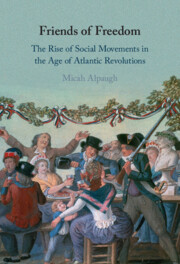Book contents
- Friends of Freedom
- Friends of Freedom
- Copyright page
- Contents
- Acknowledgments
- Introduction
- Part I The American Revolution Ignites Social Movements
- 1 The Sons of Liberty and the Creation of a Movement Model
- 2 From Boycott Mobilization to the American Revolution
- 3 Wilkes, Liberty, and the Anglo-American Crisis
- 4 The British Association Movement and Parliamentary Reform
- 5 The Irish Volunteers and Militant Reform
- 6 Religious Freedom, Political Liberty, and Protestant Dissenter Civil Rights
- 7 The Rise of American Abolitionism
- 8 British Abolitionism and the Broadening of Social Movements
- Part II The French Revolution Radicalizes Social Movements
- Bibliography
- Index
6 - Religious Freedom, Political Liberty, and Protestant Dissenter Civil Rights
from Part I - The American Revolution Ignites Social Movements
Published online by Cambridge University Press: 29 October 2021
- Friends of Freedom
- Friends of Freedom
- Copyright page
- Contents
- Acknowledgments
- Introduction
- Part I The American Revolution Ignites Social Movements
- 1 The Sons of Liberty and the Creation of a Movement Model
- 2 From Boycott Mobilization to the American Revolution
- 3 Wilkes, Liberty, and the Anglo-American Crisis
- 4 The British Association Movement and Parliamentary Reform
- 5 The Irish Volunteers and Militant Reform
- 6 Religious Freedom, Political Liberty, and Protestant Dissenter Civil Rights
- 7 The Rise of American Abolitionism
- 8 British Abolitionism and the Broadening of Social Movements
- Part II The French Revolution Radicalizes Social Movements
- Bibliography
- Index
Summary
During the American Revolution, abolitionism became a social movement for the first time. Amid their appeals for liberty and equality, Americans increasingly realized the contradictions of owning slaves, and even prominent Founding Father slaveholders spoke of the need to find ways to reform or phase out the institution. The first explicit abolitions in the world occurred amid the War of Independence. By the early republic, antislavery societies became numerous – though the cause’s momentum was thwarted in the closed-door Constitutional Convention and the rise of cotton in the American South in the 1790s motivated a new spread of slavery.
Keywords
- Type
- Chapter
- Information
- Friends of FreedomThe Rise of Social Movements in the Age of Atlantic Revolutions, pp. 144 - 170Publisher: Cambridge University PressPrint publication year: 2021

